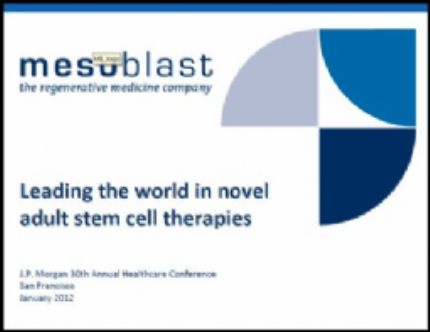
Mesoblast Limited (ASX:MSB) Single Dose Of Proprietary Adult Stem Cells Regenerates Damaged Pancreas And Reduces Blood Glucose Levels In Diabetes
Melbourne, Dec 18, 2009 AEST (ABN Newswire) - Mesoblast Limited (ASX:MSB)(PINK:MBLTY) today announced significant preclinical trial results showing that the proprietary adult stem cell platform could be an effective treatment for diabetes.
In a collaborative study performed with Dr Ravi Krishnan, senior scientist at the Queen Elizabeth Hospital in Adelaide, South Australia, a single dose of the patented human Mesenchymal Precursor Cells (MPCs) injected into mice with diabetes resulted in a significant increase in blood insulin levels and sustained reduction in blood glucose levels for the entire three-week period of follow-up. This was due to restoration in the damaged pancreas of the balance between insulin-producing beta cells, which reduce blood glucose, and glucagon-producing alpha cells, which increase blood glucose.
Leading international diabetes expert Professor Michael Horowitz, Director of the Endocrine and Metabolic Unit at The Royal Adelaide Hospital, who has reviewed the results said: "These data are very exciting, and clearly demonstrate the potential of using these unique adult stem cells in the treatment of patients with Type 2 diabetes".
Type 2 diabetes accounts for 90-95 per cent of the 230 million diabetics in the western world, and its prevalence is increasing at an alarming rate. Complications include heart disease, chronic kidney failure, blindness, nerve damage and lower extremity amputations. Injections of insulin are used only as a last resort in Type 2 diabetics because of the risk of lowering glucose levels too greatly and too rapidly (hypoglycemia). Newer treatment modalities for Type 2 diabetes aim to enhance the ability of pancreatic beta cells to produce more insulin in an effort to better control blood glucose.
In the collaborative study, diabetes was induced by partial chemical destruction of the pancreas in 35 mice that were then randomised to receive either a single injection into the bloodstream of human MPCs or control. Three weeks later, MPC-treated diabetics had two-fold greater numbers of pancreatic islets than diabetic controls (p=0.0012), and a ratio of insulin-producing beta cells to glucagon-producing alpha cells which was 29% higher than in diabetic controls (p=0.005). MPC-treated diabetics demonstrated a 35% maximal reduction in blood glucose levels (p=0.012) and a 34% increase in blood insulin levels (p=0.04) compared with diabetic controls over the three weeks of follow-up. No subjects had reduction in glucose levels below normal, indicating that MPCs may have a safer profile than insulin injections with respect to risk of hypoglycemia.
"These results suggest that the MPCs enhanced endogenous pancreatic beta cell regeneration, resulting in safe and sustained augmentation of insulin secretion and reduction in blood glucose levels," Professor Horowitz added.
Mesoblast Executive Director, Professor Silviu Itescu, said: "The Company will move quickly towards the clinic to target what is termed the western world's largest healthcare epidemic.
"We believe there is clear proof of principle to use our patented cells for diabetes and we will work towards translating these results to humans as quickly as possible," he added.
Contact
Julie Meldrum
Corporate Communications Director
Mesoblast Limited
Tel: +61-3-9639-6036
Mob: +61-419-228-128
Email: julie.meldrum@mesoblast.com
www.mesoblast.com
| ||
|





